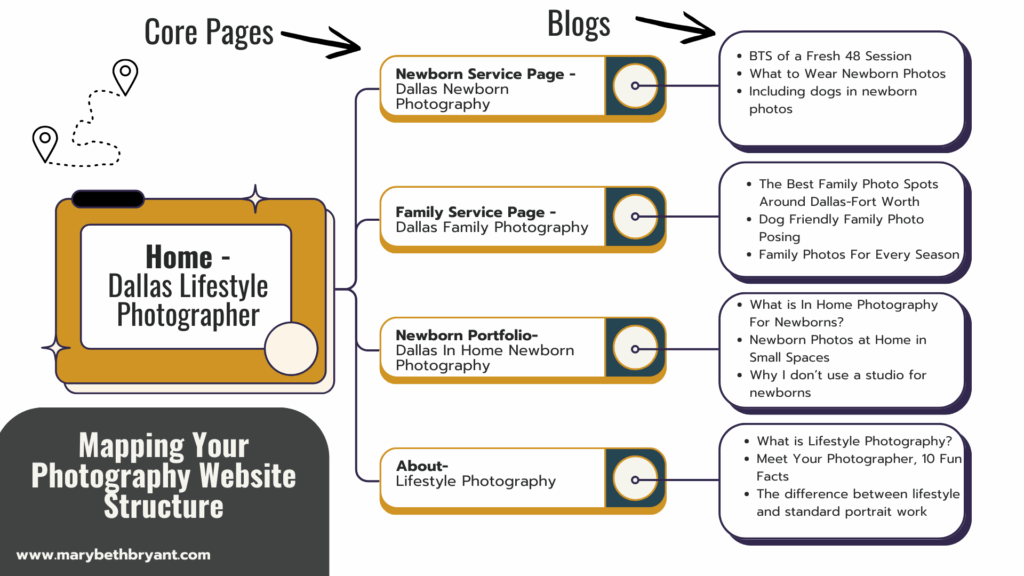Photographers know composition matters. But while you spend hours perfecting the flow of your portrait sessions, your website may not get the same careful structure. And here’s the thing: your photography website structure directly impacts how search engines understand your site, how you ranked, and how clients move through it.
I mention this because even before I dial in keyphrase planning with my photography clients we are mapping out and brainstorming client structure. One of the simplest but most overlooked places to start? Your site’s structure.
Start With the Umbrella: Your Homepage Theme or Main Goal
Your homepage sets the overarching theme for your site. It’s the anchor that tells both people and search engines what your business is about and what to expect when they visit your site.
Examples:
- Lifestyle Photographer Dallas, TX (broad enough to cover multiple services)
- Wyoming Motherhood Photographer (clear and specific niche)
- Charleston Wedding Photographer (niche but location-rich)
👉 The key: your homepage should define your main identity. Everything else on your site branches down from here. It’s OK if this keyword feels a little big or competitive, I’ll talk more about that later.
Add the Pillars: Core Service + Supporting Pages to Your Photography Websites Structure
Next come your pillars—the service and core pages that hold up your homepage promise. Each should have one main SEO goal. Remember you can target and rank for hundreds of things but you should have one main goal per page. (If you’re not sure how to define that, check out my on demand Free Key Phrase Training.)
For Niche photography businesses you might be able to have less pillar pages my utilizing one service/investment page but if you’re multi passionate, building out your core pages is helpful for SEO and in competitive markets.
Pillar examples:
- Service pages (weddings, newborns, branding)
- Investment page (or include pricing details directly on service pages)
- Portfolio or gallery pages
- FAQ or “What to Expect”
Multi-service vs. Singularly Focused Photography Businesses
Not sure if you’re multi-service or niche? Think about your client’s journey.
- Weddings, engagements, and elopements → one type of client, so these can often live together under one service structure.
- Families, newborns, and branding → very different client needs. Separate pages help each audience feel seen.
The goal isn’t to create dozens of pages, it’s to make your structure match your client’s journey.
And here is the SEO angle… Google prioritizes strong site structure as it allows you to demonstrate your authority and expertise on given topics. Authority and Expertise = Big Boost to Rankings
Build the Beams: Blogs That Support Your Services
Once your pillars are in place, add support beams in the form of blog content. Blogs give depth to your service pages, answer client questions, and strengthen your authority in search.
Quick checklist for supporting blogs:
- Aim for 3–5 blogs that support each service page or core page (about, FAQ, etc)
- Each blog should link back to its related service page
- Your core pages should also link down to a few related blogs
- Topics should answer real client questions (e.g., “When to book a newborn session” or “Top Charleston Elopement Spots”)
“Blogging isn’t busywork—Intentionally blog or don’t blog at all. Blogs are the supporting structure that proves your expertise to both search engines and clients.”
Tie It Together: Internal Linking Brings Your Photography Website Structure Together
Internal links are the framework that makes your structure solid. Without them, your homepage, service pages, and blogs just float in isolation. Google (and all search engines) struggle with islands or pages that aren’t linked to anything else.
A healthy internal linking structure example might look something like this:
- Homepage → core pages, best blog post
- Service pages → related blogs, portfolio
- Blogs → back to service pages and homepage
- Portfolios → Back to your service page or FAQ
This framework makes it easy for clients to move naturally through your site, and it signals to Google how your content fits together. As you build new content, make sure it fits somewhere in your existing structure.

Where Every Website (and SEO Redesign) Should Begin
Every strong photography website structure starts with the same foundation:
- Define your homepage theme (the umbrella)
- Map out your core service and support pages with their sub themes (the pillars)
- Draft 3–5 supporting blog ideas per service (the beams)
You don’t need to hire a pro to begin this process. Grab a notebook, open a Google doc, and start sketching it out. Drafting your structure is where both brand-new sites and full SEO redesigns should begin.
Why You Can Trust This Roadmap For Your Photography Website Structure
Before I built a photography business that has lasted more than a decade, I was an analyst living with data. Now I pair that love of clarity and structure with the creative side of running a photography business. In other words: I’ve lived both the spreadsheets and the creative love of photographing clients. That’s why when I talk about photography website structure, it’s not theory—it’s the exact framework I know works for photographers, myself and many others that I’ve helped redesign the site for better SEO and attracting their ideal clients.
For more free tools and support check out my resource page. While you’re there be sure to sign up for my SEO community.
